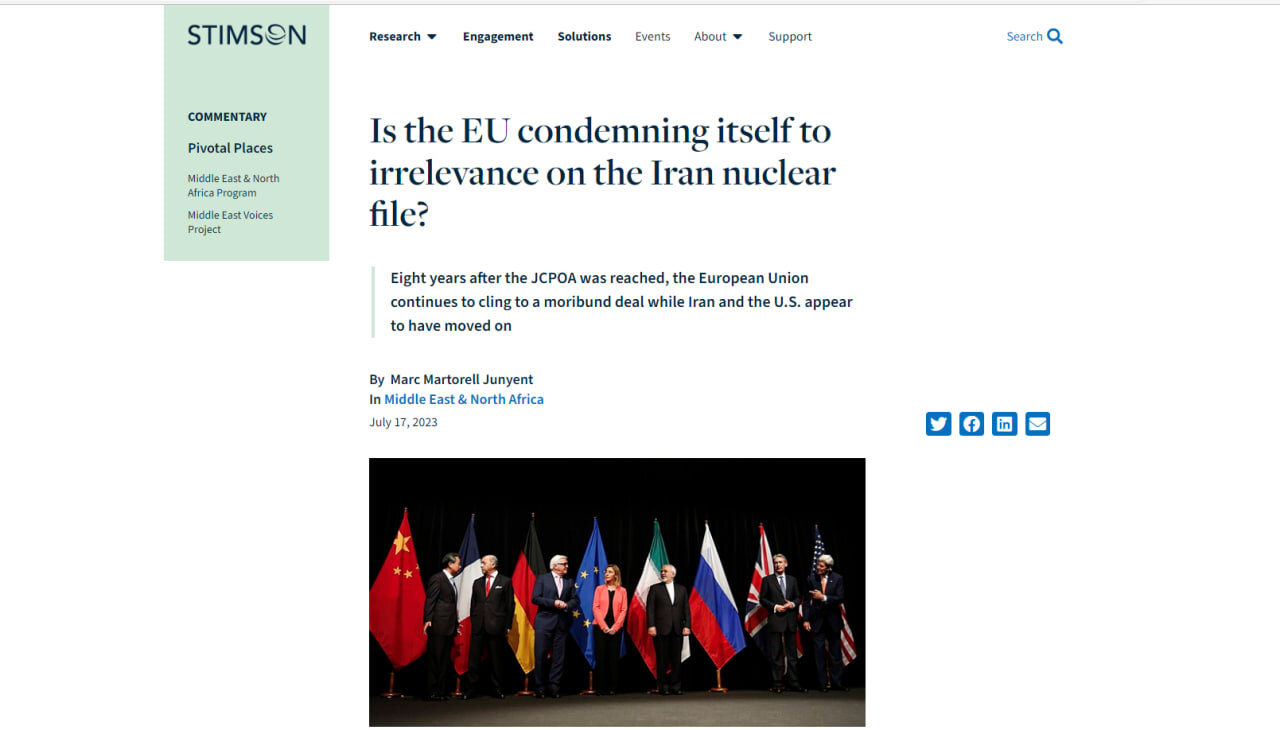Europe is not innocent!

TEHRAN - It cannot be denied that Europe has had its share of wrongdoing.
It has been eight years since the Joint Comprehensive Plan of Action (JCPOA) was reached. The International Energy Agency (IEA) confirmed that Iran was fulfilling all its obligations under this agreement one year after the U.S. pullout from the agreement. However, Iran did not benefit much from it. The Western media have attributed the situation to Iran's lack of cooperation and Trump's mistakes. Throughout this analysis, it has been clear that European countries have consistently played a constructive role in advancing the agreement and should not be held responsible for the current situation.
On July 17th, Marc Mrtorell Junyent wrote a report for the Stimson think tank emphasizing a recurring issue. The report notes that despite the European Union's past facilitating role in negotiating the Iran nuclear agreement, known as the JCPOA, and bridging the gap between Tehran and Washington for 12 years, the EU has been excluded from the current negotiation process. The report explicitly references to the indirect talks occurring between Iran and the U.S. in Oman and highlights the secondary role of the EU in these talks.
"There are several reasons for the EU’s current marginal role; in the eyes of Iran, the EU has a serious credibility problem," says Marc Junyent. The Stimson think tank further points to the less effective efforts of the EU, such as the establishment of the Instrument in Support of Trade Exchanges (INSTEX), a European special-purpose vehicle (SPV) established on 31 January 2019 with a mission to facilitate non-USD and non-SWIFT transactions with Iran to avoid breaking U.S. sanctions, and writes that, from Iran's point of view, European governments failed to honor their undertakings. Also, Junyent believes that continuing this situation will completely marginalize Europe. This report tries to present the constructive role of the EU towards the preservation of JCPOA as different from the U.S. approach. Meanwhile, Europe is to blame for the current situation in two ways.
First- Europe's inability to act independently
In response to the West's concerns about Iran's nuclear program, Europe started negotiations with Iran before the United States. After several months of discussions, the three European countries of Britian, France and Germany, in the first round of talks, forced Iran to limit and ultimately halt its nuclear program in exchange for assurances that international organizations would not rebuke Iran. However, these assurances were never fulfilled, and Iran continued to be accused by the International Atomic Energy Agency (IAEA) Board of Governors. Eventually, the case was brought before the United Nations Security Council (UNSC).
The process was repeated for the JCPOA. Before Trump's withdrawal from the nuclear deal, Iran had expressed its dissatisfaction with the lack of cooperation from European banks and companies. However, Europe's response was not practical. Following the U.S. withdrawal from the JCPOA, Europe could not create an opportunity for European state-owned enterprises (SOEs) to work with Iran. Junyent's report also said that Europe's final attempt was to create a financial channel named INSTEX, which ultimately failed without notable outcomes.
Despite European countries advocating for the JCPOA as the ideal solution for addressing Iran's nuclear program, they have been unable to take adequate measures to preserve it. Iran has chosen to engage in indirect talks with the U.S. instead of prioritizing negotiations with the EU due to the EU’s inability to make independent choices apart from the U.S.
Second - accompanying the U.S. in putting pressure on Iran
Many experts believe Europe's inability to commit to agreements is only part of the story. Instead, the European countries are also responsible for exerting pressure on Iran. Europe cannot resist the U.S., and in many cases, it is unwilling to do it. This is because the European attitude towards Iran is aligned with the U.S. in many areas. Even in some cases, they have taken a much harsher tone toward Iran because Iran’s rising power is more of a threat to Europe than the U.S.
As an illustration, lifting Iran's missile sanctions falls under the JCPOA and is part of past agreements; however, Europe has opposed it. European officials have issued warnings to Iran about extending these sanctions. Despite military officials stating that Iran has no intention of increasing the range of its missiles, Europe is apprehensive about Iran's missile advancements and wants to restrict them. Consequently, this situation has placed Europe against Iran.
However, Europe has been working closely with the U.S. in utilizing JCPOA to threaten Iran. As the U.S. is not a party to the JCPOA, it cannot activate the trigger mechanism to return UN Security Council sanctions against Iran. Despite Europe's professed desire to uphold the JCPOA, several European countries have repeatedly threatened to activate the trigger mechanism against Iran. This is concerning as Iran is currently negatively impacted by the JCPOA.
Meanwhile, Europe is not aiding Iran's economy under the JCPOA but harming Iran’s financial stability by supporting U.S. sanctions and implementing new ones. This approach by Europe gives credibility to the actions of the United States. Despite claiming to adhere to the JCPOA, Europe is still in animosity with Iran. While the U.S. can be held responsible for breaking the agreement by withdrawing from the JCPOA, Iran is being blamed for non-compliance due to Europe's irresponsible actions.
European countries’ challenge with fully implementing the JCPOA is not solely due to their inability to resist the U.S. Instead, European nations appear unwilling to adhere strictly to the JCPOA and seek to impose restrictions on Iran.
Leave a Comment